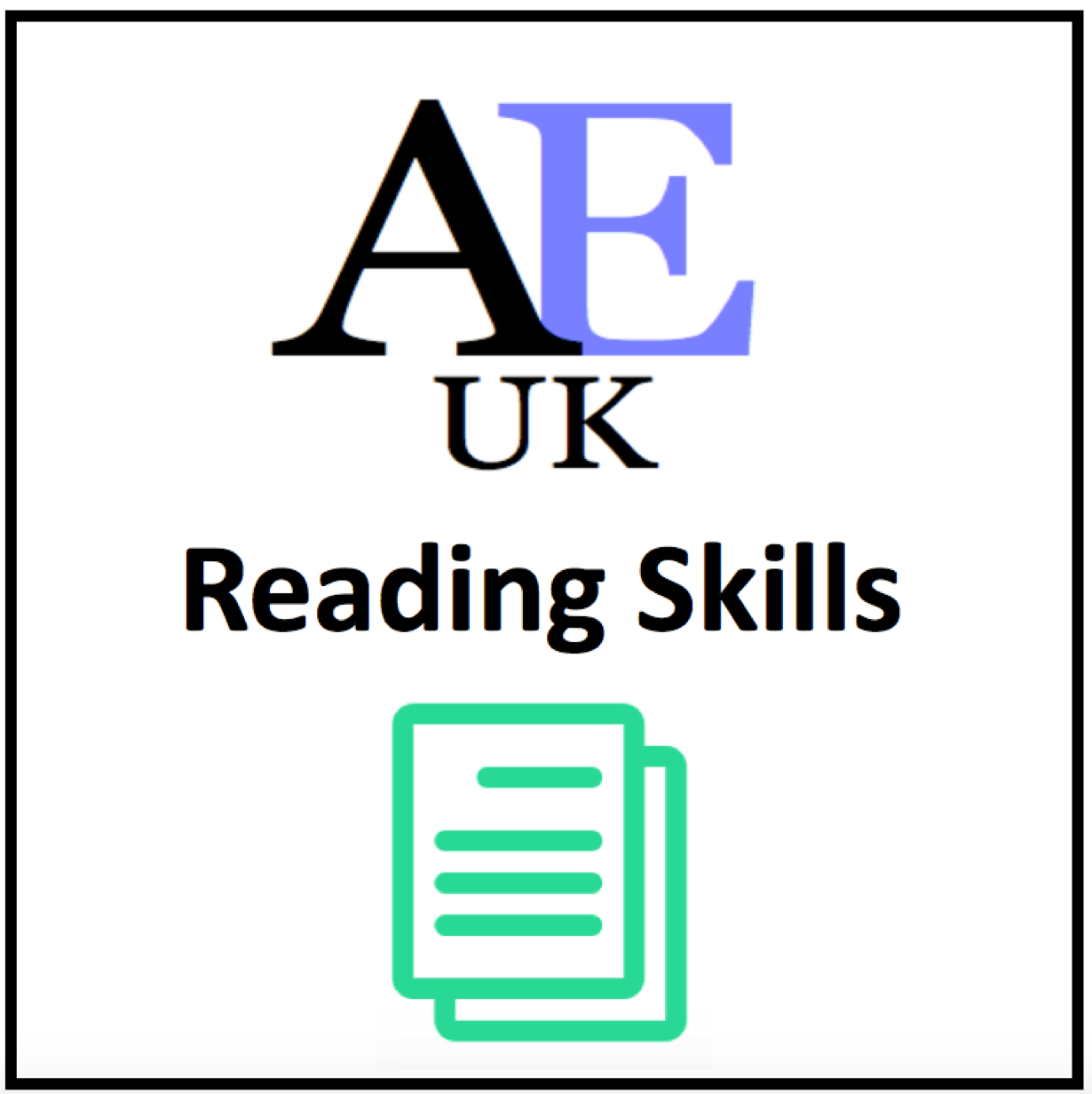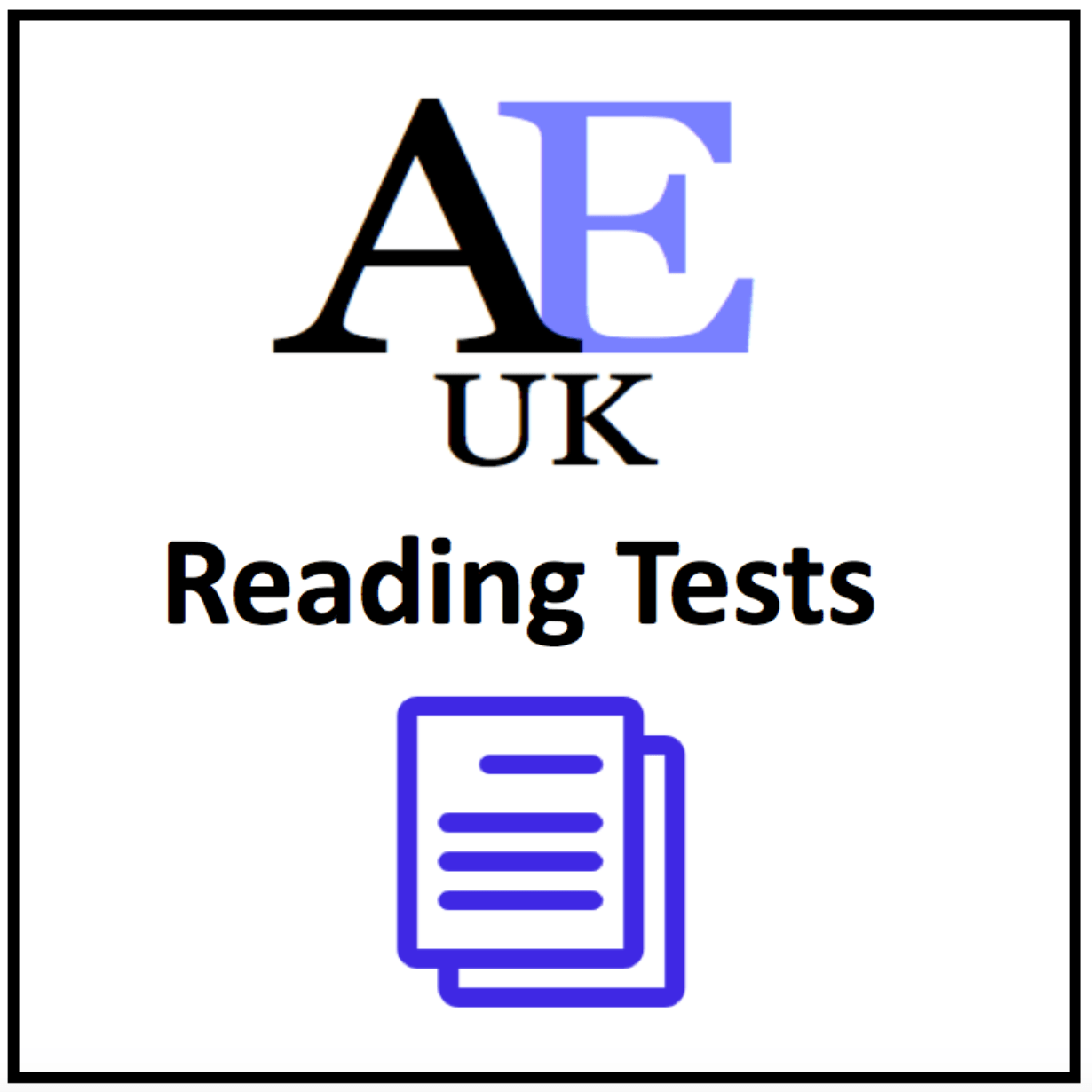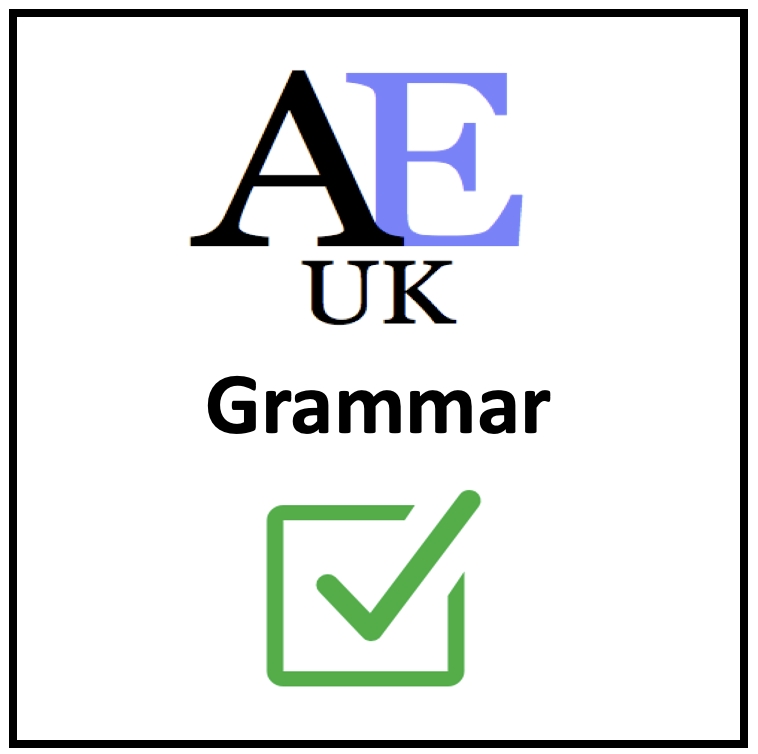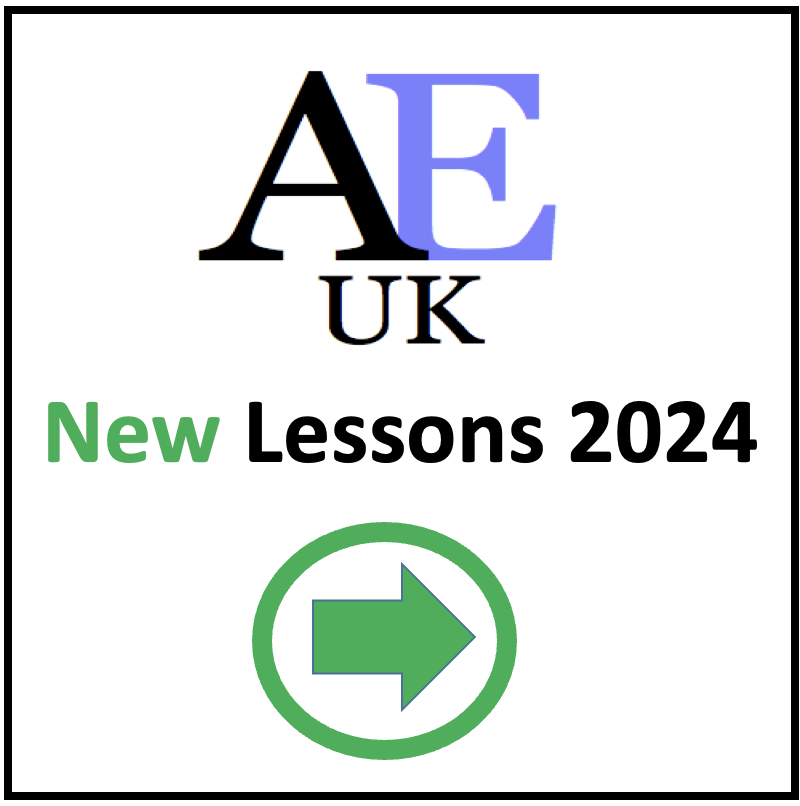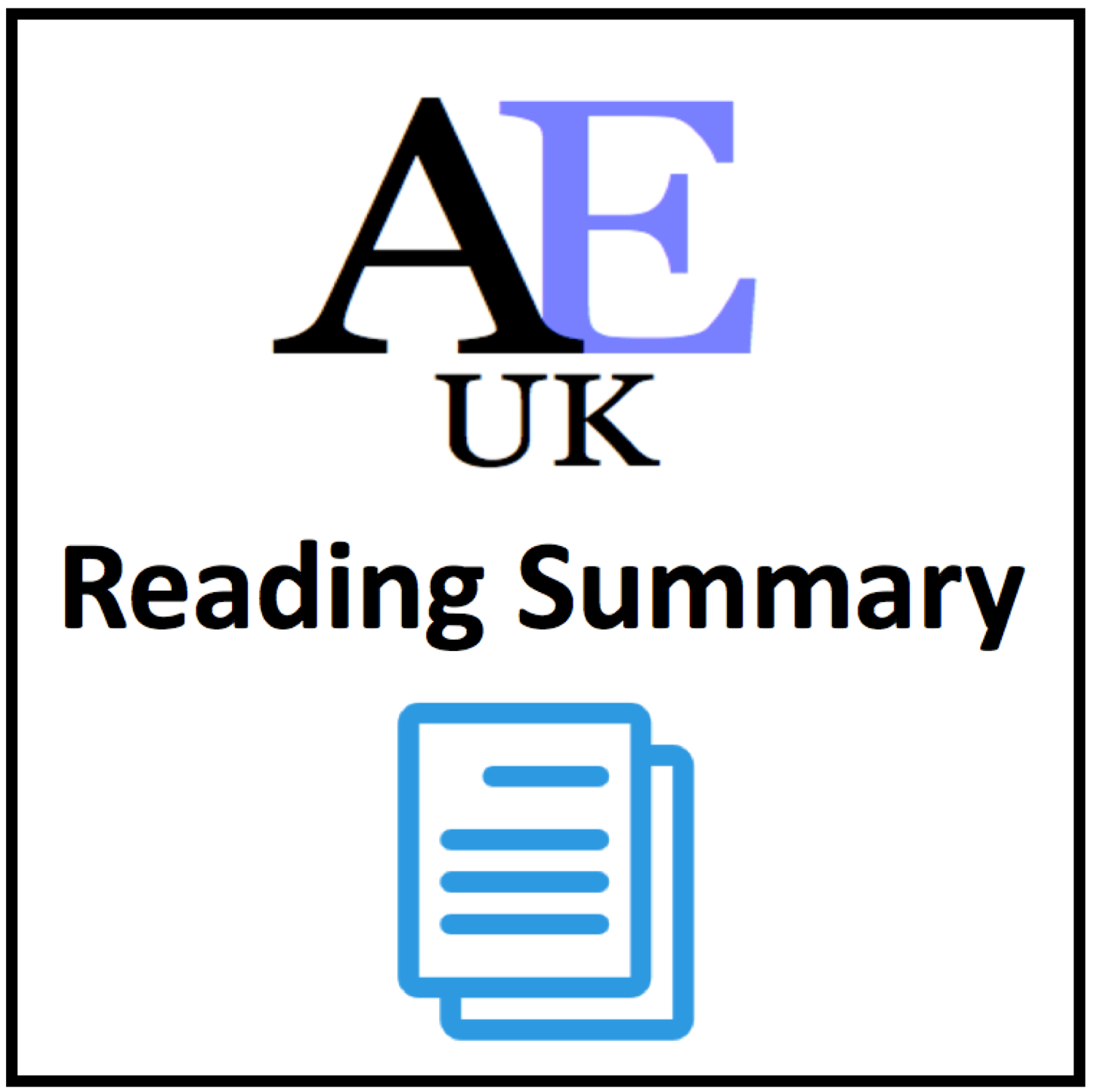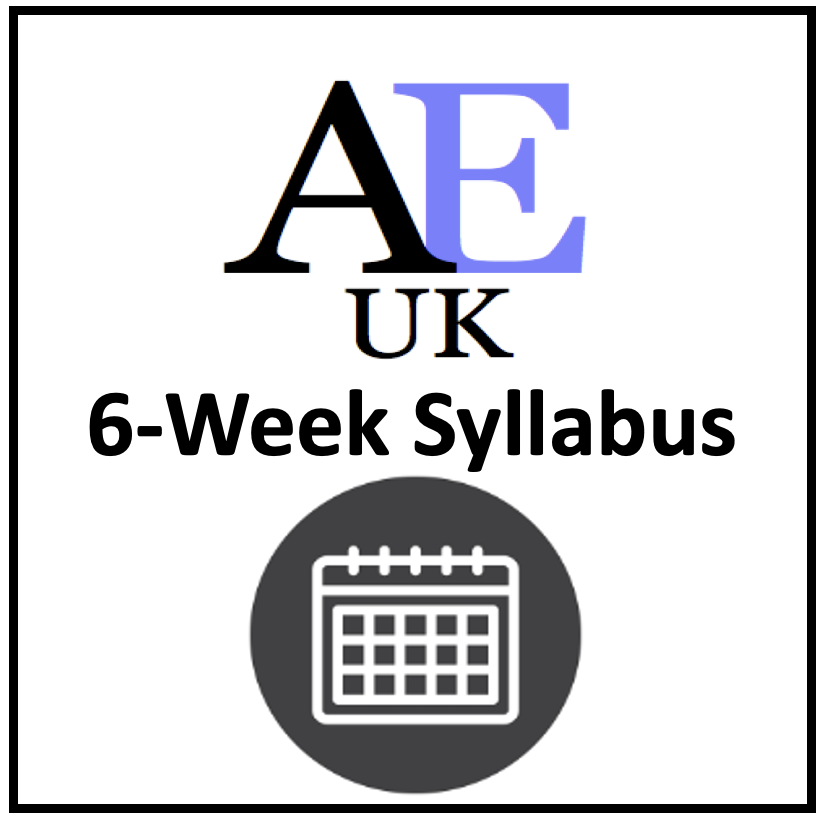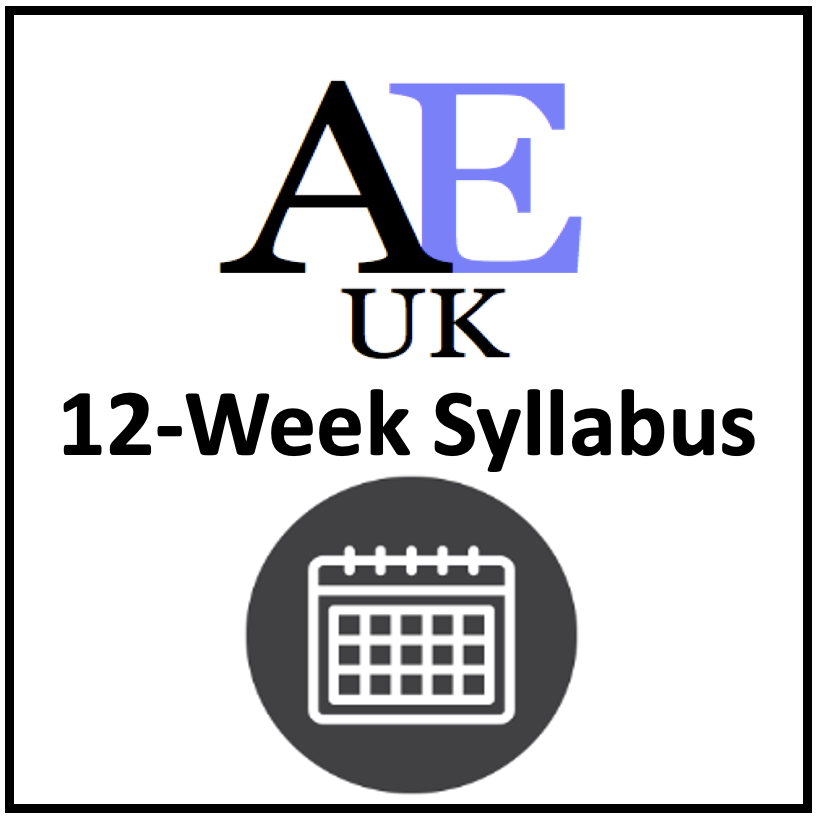Academic Speaking Lessons
What is academic speaking? Academic speaking is mainly focused on three key areas: presentations, seminars and tutorials. Presentations need to be well structured, logical, and well signposted with clear visuals. Seminars need to be well prepared for in advance with a good understanding of key material to discuss. Seminars are a central part of learning at university through pre-reading texts and post lecture discussions and therefore students need to be able to interact with other students effectively. Tutorials are usually a group or one-to-one meeting with your tutor to discuss an outline of an essay, issues you are experiencing or questions about previous lectures / lessons (Wilson, 2022).
Debates
Academic debating at university, debate phrases and key processes. Click here.
Presentations
Academic presentations, signposting language and delivery tips. Click here.
Seminars
Seminars are small group discussions. Seminar phrases and advice. Click here.
Academic Speaking Phrases
Debate phrases
key phrases to use in debates
Presentation phrases
key phrases to use in presentations
Seminar phrases
key phrases to use in seminars
 Classroom Mingle – a getting-to-know you activity
Classroom Mingle – a getting-to-know you activity
This lesson comprises of twenty different speaking questions. Students mingle around the room asking and answering questions on a range of questions based around their university study. (see example). Level ***** [B1/B2/C1] / TEACHER MEMBERSHIP / INSTITUTIONAL MEMBERSHIP
*
 Classroom Questions – improving students’ interaction skills
Classroom Questions – improving students’ interaction skills
This lesson is a basic worksheet for students to create common classroom questions. Examples are asking the teacher for an example, or what’s a synonym of that word? This lesson helps to build students’ confidence and classroom interaction skills. (see example). Level ***** [B1/B2/C1] / TEACHER MEMBERSHIP / INSTITUTIONAL MEMBERSHIP
*
 Speaking Tasks – Analysis & Evaluation
Speaking Tasks – Analysis & Evaluation
This lessons includes six speaking task cards (halls of residence, speaking English, greener university, plagiarism, congestion, homelessness). In small groups students discuss the situation, analyse the key issues/areas and evaluate which are the most effective (see example). Level ***** [B2/C1] / TEACHER MEMBERSHIP / INSTITUTIONAL MEMBERSHIP
*
 Pronunciation: worksheets
Pronunciation: worksheets
This is a download of the two pronunciation sheets. The first sheet is a general English sheet to practise the basics and the second is based on academic vocabulary. Video Level: ***** [B1/B2/C1] TEACHER MEMBERSHIP / INSTITUTIONAL MEMBERSHIP
 Pronunciation: Arabic & Chinese Speakers
Pronunciation: Arabic & Chinese Speakers
This is a download of the two pronunciation sheets. It focuses on the individual sounds that Arabic and Chinese speakers have problems with. Webpage Link Level: ***** [B1/B2/C1] TEACHER MEMBERSHIP / INSTITUTIONAL MEMBERSHIP
Describing Graphs and Charts
Describing graphs – the basics
This lesson begins labelling the key features of a graph and naming different graph / chart types. It then provides a practice to see if students can describe a range of different lines (peak, plummet, etc..). This is followed by a fun activity where in pairs students describe and plot the lines on four graphs. Example. Level: ***** [B2/C1] / TEACHER MEMBERSHIP / INSTITUTIONAL MEMBERSHIP
*
Describing graphs / presentation – analysis and evaluation (lesson below)
This lesson begins with describing basic graphs and suggesting what they could represent. It then provides the language necessary for describing, analysing and evaluating with a guided practice. This is followed by students researching and analysing graphs/charts/tables from the Office of National Statistics (ONS) and giving a short presentation on their findings. Example. Level: ***** [B2/C1] / TEACHER MEMBERSHIP / INSTITUTIONAL MEMBERSHIP
*
Speaking Tests
 Speaking Tests / Practice x5
Speaking Tests / Practice x5
These academic speaking tests are similar to the Cambridge B2 First (FCE) speaking exam but follow a university-based narrative. These tests (or lessons) are designed for lower-level students (A2, B1, B2 level) to provide valuable speaking practice around the social English aspect of university life and study. Each test is divided into four parts; general topics, photograph comparison, a task and opinion based questions (see example). Level ***** [A2/B1/B2] TEACHER MEMBERSHIP / INSTITUTIONAL MEMBERSHIP
*
Academic Speaking Topics
Easy level
- What do you do to relax?
- Do you relax on your own or with others?
- How do people in your country relax?
- How do your parents relax?
- Should people buy or rent houses?
- Benefits and drawbacks
- Parents, friends, your future
- What is your favourite technology app?
- Why?
- How it works?
- Other apps that are important to you
Medium Level:
Education
What are the benefits of studying in another country in terms of quality of education, the cultural experience and future employment benefits?
Family
From the perspective of children, their parents and grandparents, what are the advantages of all three generations living together in one house?
Transport
In terms of cost comfort and convenience, which is a better way to travel by car or train?
Hard level:
A Foreign Language
From a personal, economic and social perspective, what effect can learning a foreign language have on your life?
Global population
How will the increasing global population affect people in their home, working and financial lives?
Environment
How could a move towards a greener environment affect countries economically, socially and politically?
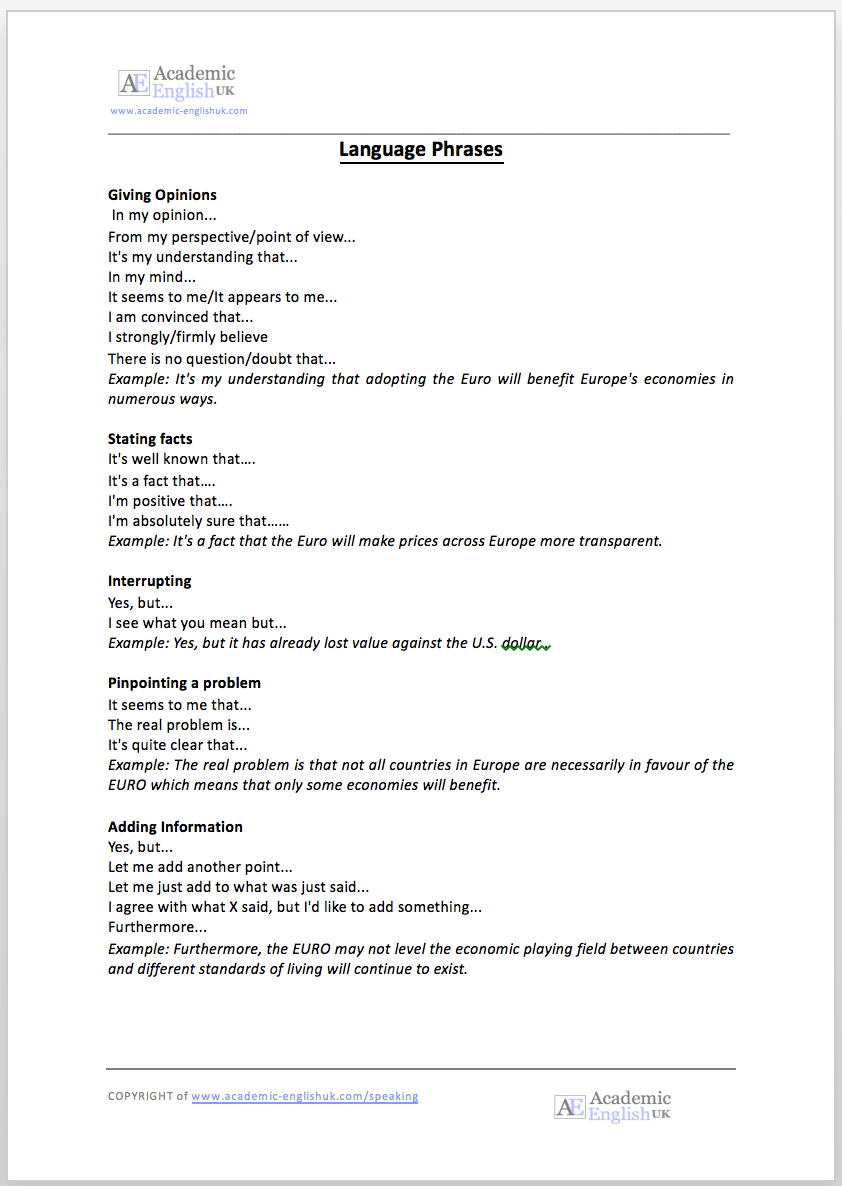
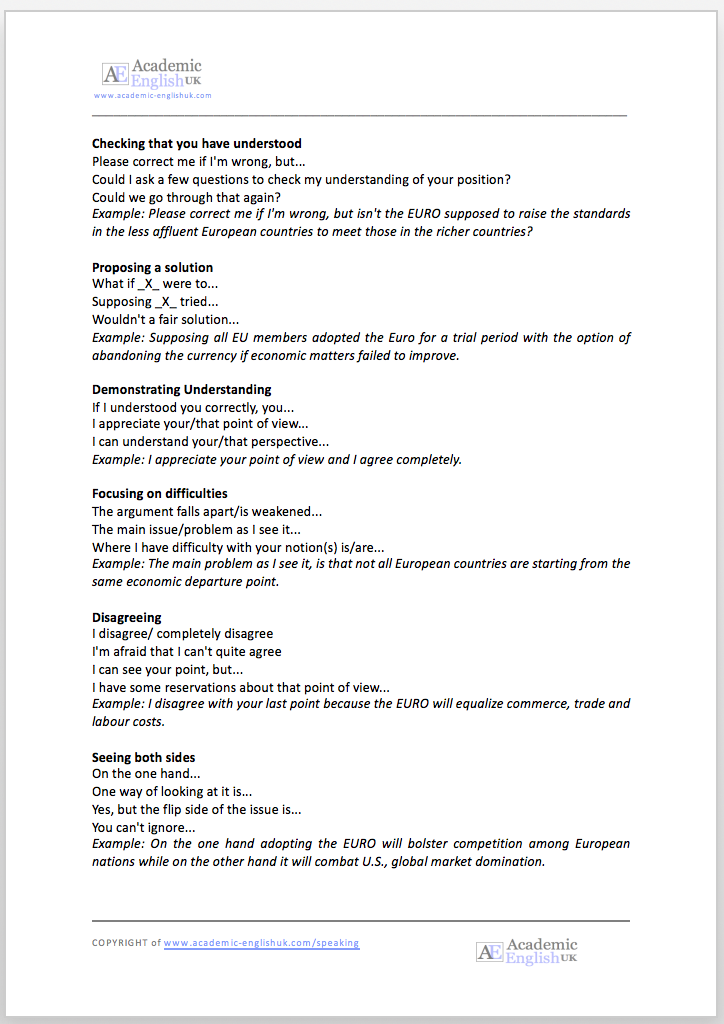
Seminar Phrases Sheet: a range of standard English phrases
Suitable phrases to use for giving opinions, facts, interrupting, understanding, summarising, examples and disagreeing
x
More digital resources and lessons
Readings
online resources
Tests
online resources
Grammar
online resources
Medical English
online resources
New for 2024
online resources
DropBox Files
Members only
Writing
online resources
Summary
online resources
Vocabulary
online resources
Instant Lessons
online resources
Marking Criteria
online resources
OneDrive Files
Members only
Listening
online resources
Argument
online resources
Critical Thinking
online resources
Topic-lessons
online resources
Feedback Forms
online resources
6-Week Course
Members only
Speaking
online resources
SPSE Essays
online resources
Free Resources
online resources
Charts and graphs
online resources
AEUK The Blog
online resources
12-Week Course
Members only







